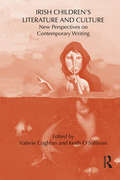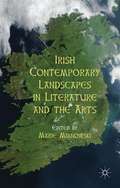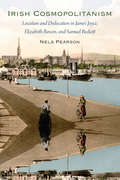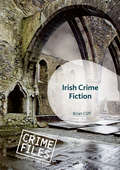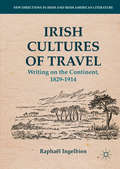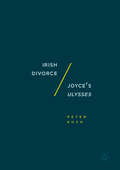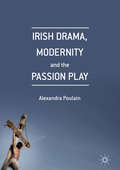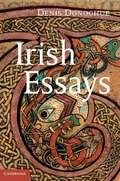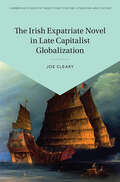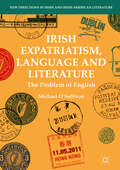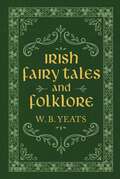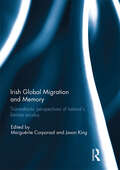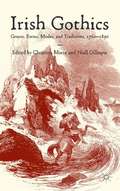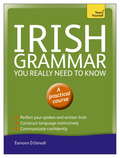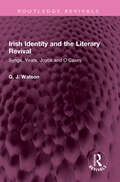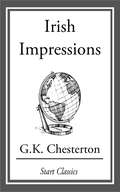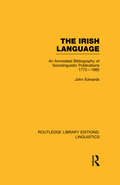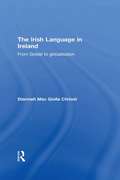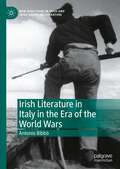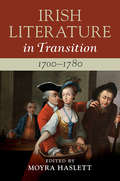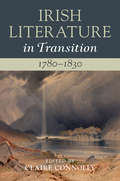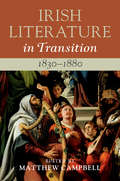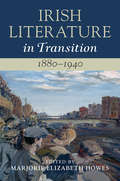- Table View
- List View
Irish Children's Literature and Culture: New Perspectives on Contemporary Writing (Children's Literature and Culture)
by Keith O'Sullivan Valerie CoghlanIrish Children’s Literature and Culture looks critically at Irish writing for children from the 1980s to the present, examining the work of many writers and illustrators and engaging with major genres, forms, and issues, including the gothic, the speculative, picturebooks, ethnicity, and globalization. It contextualizes modern Irish children’s literature in relation to Irish mythology and earlier writings, as well as in relation to Irish writing for adults, thereby demonstrating the complexity of this fascinating area. What constitutes a "national literature" is rarely straightforward, and it is especially complex when discussing writing for young people in an Irish context. Until recently, there was only a slight body of work that could be classified as "Irish children’s literature" in comparison with Ireland’s contribution to adult literature in the twentieth century. The contributors to the volume examine a range of texts in relation to contemporary literary and cultural theory, and children’s literature internationally, raising provocative questions about the future of the topic. Irish Children’s Literature and Culture is essential reading for those interested in Irish literature, culture, sociology, childhood, and children’s literature. Valerie Coghlan, Church of Ireland College of Education, Dublin, is a librarian and lecturer. She is a former co-editor of Bookbird: An International Journal of Children's Literature. She has published widely on Irish children's literature and co-edited several books on the topic. She is a former board member of the IRSCL, and a founder member of the Irish Society for the Study of Children's Literature, Children's Books Ireland, and IBBY Ireland. Keith O’Sullivan lectures in English at the Church of Ireland College of Education, Dublin. He is a founder member of the Irish Society for the Study of Children’s Literature, a former member of the board of directors of Children’s Books Ireland, and past chair of the Children’s Books Ireland/Bisto Book of the Year Awards. He has published on the works of Philip Pullman and Emily Brontë.
Irish Contemporary Landscapes in Literature and the Arts
by Marie MianowskiLooking at representations of the Irish landscape in contemporary literature and the arts, this volume discusses the economic, political and environmental issues associated with it, questioning the myths behind Ireland's landscape, from the first Greek descriptions to present day post Celtic-Tiger architecture.
Irish Cosmopolitanism: Location and Dislocation in James Joyce, Elizabeth Bowen, and Samuel Beckett
by Nels PearsonDonald J. Murphy Prize for a Distinguished First Book "Pearson is convincing in arguing that Irish writers often straddle the space between national identity and a sense of belonging to a larger, more cosmopolitan environment."--Choice "Demonstrat[es]. . .just what it is that makes comparative readings of history, politics, literature, theory, and culture indispensable to the work that defines what is best and most relevant about scholarship in the humanities today."--Modern Fiction Studies "[An] admirable book . . . Repositions the artistic subject as something different from the biographical Joyce, Bowen, or Beckett, cohering as a series of particular aesthetic responses to the dilemma of belonging in an Irish context."--James Joyce Broadsheet "A smart and compelling approach to Irish expatriate modernism. . . . An important new book that will have a lasting impact on postcolonial Irish studies."--Breac "Clearly written, convincingly argued, and transformative."--Nicholas Allen, author of Modernism, Ireland and Civil War "Goes beyond 'statism' and postnationalism toward a cosmopolitics of Irish transnationalism in which national belonging and national identity are permanently in transition."--Gregory Castle, author of The Literary Theory Handbook "Shows how three important Irish writers crafted forms of cosmopolitan thinking that spring from, and illuminate, the painful realities of colonialism and anti-colonial struggle."--Marjorie Howes, author of Colonial Crossings: Figures in Irish Literary History "Asserting the simultaneity of national and global frames of reference, this illuminating book is a fascinating and timely contribution to Irish Modernist Studies."--Geraldine Higgins, author of Heroic Revivals from Carlyle to Yeats Looking at the writing of three significant Irish expatriates, Nels Pearson challenges conventional critical trends that view their work as either affirming Irish anti-colonial sentiment or embracing international identity. In reality, he argues, these writers constantly work back and forth between a sense of national belonging that remains incomplete and ideas of human universality tied to their new global environments. For these and many other Irish writers, national and international concerns do not conflict, but overlap--and the interplay between them motivates Irish modernism. According to Pearson, Joyce 's Ulysses strives to articulate the interdependence of an Irish identity and a universal perspective; Bowen's exiled, unrooted characters are never firmly rooted in the first place; and in Beckett, the unsettled origin is felt most keenly when it is abandoned for exile. These writers demonstrate the displacement felt by many Irish citizens in an ever-changing homeland unsteadied by long and turbulent decolonization. Searching for a sense of place between national and global abstractions, their work displays a twofold struggle to pinpoint national identity while adapting to a fluid cosmopolitan world.
Irish Crime Fiction (Crime Files)
by Brian CliffThis book examines the recent expansion of Ireland's literary tradition to include home-grown crime fiction. It surveys the wave of books that use genre structures to explore specifically Irish issues such as the Troubles and the rise and fall of the Celtic Tiger, as well as Irish experiences of human trafficking, the supernatural, abortion, and civic corruption. These novels are as likely to address the national regulation of sexuality through institutions like the Magdalen Laundries as they are to follow serial killers through the American South or to trace international corporate conspiracies.This study includes chapters on Northern Irish crime fiction, novels set in the Republic, women protagonists, and transnational themes, and discusses Irish authors’ adaptations of a well-loved genre and their effect on assumptions about the nature of Irish literature. It is a book for readers of crime fiction and Irish literature alike, illuminating the fertile intersections of the two.
Irish Cultures of Travel
by Raphaël IngelbienThis book analyses travel texts aimed at the emergent Irish middle classes in the long nineteenth century. Unlike travel writing about Ireland, Irish travel writing about foreign spaces has been under-researched. Drawing on a wide range of neglected material and focusing on selected European destinations, this study draws out the distinctive features of an Irish corpus that often subverts dominant trends in Anglo-Saxon travel writing. As it charts Irish participation in a new 'mass' tourism, it shows how that participation led to heated ideological debates in Victorian and Edwardian Irish print culture. Those debates culminate in James Joyce's 'The Dead', which is here re-read through new discursive contextualizations. This book sheds new light on middle-class culture in pre-independence Ireland, and on Ireland's relation to Europe. The methodology used to define its Irish corpus also makes innovative contributions to the study of travel writing.
Irish Divorce / Joyce's Ulysses
by Peter KuchThis engrossing, ground-breaking book challenges the long-held conviction that prior to the second divorce referendum of 1995 Irish people could not obtain a divorce that gave them the right to remarry. Joyce knew otherwise, as Peter Kuch reveals—obtaining a decree absolute in Edwardian Ireland, rather than separation from bed and board, was possible. Bloom’s “Divorce, not now” and Molly’s “suppose I divorced him”—whether whim, wish, fantasy, or conviction—reflects an Irish practice of petitioning the English court, a ruse that, even though it was known to lawyers, judges, and politicians at the time, has long been forgotten. By drawing attention to divorce as one response to adultery, Joyce created a domestic and legal space in which to interrogate the sometimes rival and sometimes collusive Imperial and Ecclesiastical hegemonies that sought to control the Irish mind. This compelling, original book provides a refreshingly new frame for enjoying Ulysses even as it prompts the general reader to think about relationships and about the politics of concealment that operate in forging national identity
Irish Drama, Modernity and the Passion Play
by Alexandra PoulainThis book discusses Irish Passion plays (plays that rewrite or parody the story of the Passion of Christ) in modern Irish drama from the Irish Literary Revival to the present day. It offers innovative readings of such canonical plays as J. M. Synge's The Playboy of the Western World, W. B. Yeats's Calvary, Brendan Behan's The Hostage, Samuel Beckett's Endgame, Brian Friel's Faith Healer and Tom Murphy's Bailegangaire, as well as of less well-known plays by Padraic Pearse, Lady Gregory, G. B. Shaw, Se#65533;n O'Casey, Denis Johnston, Samuel Beckett and David Lloyd. Challenging revisionist readings of the rhetoric of "blood sacrifice" and martyrdom in the Irish Republican tradition, it argues that the Passion play is a powerful political genre which centres on the staged death of the (usually male) protagonist, and makes visible the usually invisible violence perpetrated both by colonial power and by the postcolonial state in the name of modernity.
Irish Drama, Modernity and the Passion Play
by Alexandra PoulainThis book discusses Irish Passion plays (plays that rewrite or parody the story of the Passion of Christ) in modern Irish drama from the Irish Literary Revival to the present day. It offers innovative readings of such canonical plays as J. M. Synge’s The Playboy of the Western World, W. B. Yeats’s Calvary, Brendan Behan’s The Hostage, Samuel Beckett’s Endgame, Brian Friel’s Faith Healer and Tom Murphy’s Bailegangaire, as well as of less well-known plays by Padraic Pearse, Lady Gregory, G. B. Shaw, Seán O’Casey, Denis Johnston, Samuel Beckett and David Lloyd. Challenging revisionist readings of the rhetoric of “blood sacrifice” and martyrdom in the Irish Republican tradition, it argues that the Passion play is a powerful political genre which centres on the staged death of the (usually male) protagonist, and makes visible the usually invisible violence perpetrated both by colonial power and by the postcolonial state in the name of modernity.
Irish Essays
by Denis DonoghueDenis Donoghue has been a key figure in Irish studies and an important public intellectual in Ireland, the UK and US throughout his career. These essays represent the best of his writing and operate in conversation with one another. He probes the questions of Irish national and cultural identity that underlie the finest achievements of Irish writing in all genres. Together, the essays form an unusually lively and far-reaching study of three crucial Irish writers - Swift, Yeats and Joyce - together with other voices including Mangan, Beckett, Trevor, McGahern and Doyle. Donoghue's forceful arguments, deep engagement with the critical tradition, buoyant prose and extensive learning are all exemplified in this collection. This book is essential reading for all those interested in Irish literature and culture and its far-reaching effects on the world.
The Irish Expatriate Novel in Late Capitalist Globalization (Cambridge Studies in Twenty-First-Century Literature and Culture)
by Joe ClearyThis study of contemporary Irish expatriate fiction offers a boldly original world-facing rather than nation-focused overview of the contemporary Irish novel. Chapters examine how Irish narrative deals with the United States in a time of declining global hegemony, a rising China and Asia, a thwarted and turbulent Global South, and a European Union that has decisively reshaped Ireland in the last half century. The author argues that in a late capitalist world defined by volatile economic and cultural globalizations, the Irish novel is struggling to imagine new ways to narrate the country's relationship to the world capitalist system and to find new place for Irish writing in the world literary system. Looking at a rapidly-changing Ireland in a rapidly-changing international order, Joe Cleary offers new readings of novels by Colm Tóibín, Anne Enright, Joseph O'Neill, Deirdre Madden, Mary Costello, Naoise Dolan, Aidan Higgins, Colum McCann, Ronan Sheehan and Ronan Bennett.
Irish Expatriatism, Language and Literature: The Problem of English (New Directions in Irish and Irish American Literature)
by Michael O'SullivanThis book examines how Irishness as national narrative is consistently understood ‘from a distance’. Irish Presidents, critics, and media initiatives focus on how Irishness is a global resource chiefly informed by the experiences of an Irish diaspora predominantly working in English, while also reminding Irish people ‘at home’ that Irish is the 'national tongue'. In returning to some of Ireland’s major expat writers and international diplomats, this book examines the economic reasons for their migration, the opportunities they gained by working abroad (sometimes for the British Empire), and their experiences of writing and governing in non-native English speaking communities such as China and Hong Kong. It argues that their concerns about belonging, loneliness, the desire to buy a place ‘back home’, and losing a language are shared by today’s generation of social network expatriates.
Irish Fairy Tales and Folklore
by W. B. YeatsA classic collection of Irish fairy tales and lore by Nobel Peace Prize-winning author and poet W. B. YeatsOriginally published as two separate volumes in 1800s, this premier collection of Irish stories edited and compiled W. B. Yeats is the perfect gift for any lover of Irish literature and folklore. The lyrical prose and rich cultural heritage of each tale will captivate and enchant readers of all ages and keep them entertained for hours on end.This volume contains more than seventy classic Irish stories, including timeless characters and mythology passed down for generations such as:The Trooping FairiesChangelingsTir-na-n-ógThe LepracaunThe Kildare PookaHow Thomas Connolly met the BansheeAnd many more!
Irish Global Migration and Memory: Transatlantic Perspectives of Ireland's Famine Exodus
by Marguérite Corporaal Jason KingIrish Global Migration and Memory: Transnational Perspectives of Ireland’s Famine Exodus brings together leading scholars in the field who examine the experiences and recollections of Irish emigrants who fled from their famine-stricken homeland in the mid-nineteenth century. The book breaks new ground in its comparative, transnational approach and singular focus on the dynamics of cultural remembrance of one migrant group, the Famine Irish and their descendants, in multiple Atlantic and Pacific settings. Its authors comparatively examine the collective experiences of the Famine Irish in terms of their community and institution building; cultural, ethnic, and racial encounters with members of other groups; and especially their patterns of mass-migration, integration, and remembrance of their traumatic upheaval by their descendants and host societies. The disruptive impact of their mass-arrival had reverberations around the Atlantic world. As an early refugee movement, migrant community, and ethnic minority, Irish Famine emigrants experienced and were recollected to have faced many of the challenges that confronted later immigrant groups in their destinations of settlement. This book is especially topical and will be of interest not only to Irish, migration, and refugee scholars, but also the general public and all who seek to gain insight into one of Europe’s foundational moments of forced migration that prefigures its current refugee crisis.This book was originally published as a special issue of Atlantic Studies: Global Currents.
Irish Gothics
by Christina Morin Niall GillespieScholarly interest in 'the Irish Gothic' has grown at a rapid pace in recent years, but the debate over exactly what constitutes this body of literature remains far from settled. This collection of essays explores the rich complexities of the literary gothic in eighteenth- and nineteenth-century Ireland.
Irish Grammar You Really Need to Know: Teach Yourself
by Éamonn Ó DónaillComprehensive and clear explanations of key grammar patterns and structures are reinforced and contextualized through authentic materials. You will not only learn how to construct grammar correctly, but when and where to use it so you sound natural and appropriate. Irish Grammar You Really Need to Know will help you gain the intuition you need to become a confident communicator in your new language.
Irish Grammar You Really Need to Know: Teach Yourself
by Éamonn Ó'DónaillComprehensive and clear explanations of key grammar patterns and structures are reinforced and contextualized through authentic materials. You will not only learn how to construct grammar correctly, but when and where to use it so you sound natural and appropriate. Irish Grammar You Really Need to Know will help you gain the intuition you need to become a confident communicator in your new language.
Irish Identity and the Literary Revival: Synge, Yeats, Joyce and O'Casey (Routledge Revivals)
by George WatsonFirst published in 1979, Irish Identity and the Literary Revival, through the works of W.B. Yeats, James Joyce, J. M. Synge, and Sean O’Casey, documents the complex spectrum of political, social and other pressures that helped fashion modern Ireland. At least three sets of cultural assumptions coexisted in Ireland during the years between 1890 and 1930, -- English, Irish and Anglo-Irish, each united by a common language but divided by considerable tensions and strain. The question of Irish identity forms the central theme of the study, and illustrates how it was a major, even obsessive concern for these writers. Subsidiary and interwoven themes constantly recur. Themes such as the concepts of the peasant and the hero, political nationalism, the meaning of Ireland’s history and the validity of her cultural traditions. Rather than use the literature concerned as merely endorsing evidence for a sociological or political thesis, this study allows its major themes and issues to emerge and develop from direct and close study of the work of the writers. This book will be of interest to students of literature and history.
Irish Impressions
by G. K. ChestertonPersonal impressions of the author's visit to Ireland under the direction of the War Aims Committee. Mr. Chesterton understands teh Irish thoroughly and says many fine things finely in this refreshing and stimulating book.
The Irish Language: AN Annotated Bibliography of Sociolinguistic Publications 1772-1982 (Routledge Library Editions: Linguistics)
by John EdwardsIn compiling this bibliography, the main purpose was to assemble references to published material of a sociolinguistic nature concerning the Irish language. The intent was not to cover publications treating language per se, but rather to consider those dealing with language in its social context. Represented here are articles, chapters, books and pamphlets bearing upon social, historical, psychological and educational aspects of Irish – including the decline of the language, the restoration effort, the relationship of language to nationality and religion, and studies of important figures in the language movement.
The Irish Language in Ireland: From Goídel to Globalisation (Routledge Studies in Linguistics)
by Diarmait Mac ChríostThis book comprises the first complete treatment of the Irish language in social context throughout the whole of Ireland, with a particular focus on contemporary society. The possibilities and limitations of the craft of language planning for the revival of the Irish language are outlined and the book also situates the language issue in the context of current debates on the geography, history and politics of the nature of Irish identity. A comprehensive multidisciplinary approach is adopted throughout.
Irish Literature in Italy in the Era of the World Wars (New Directions in Irish and Irish American Literature)
by Antonio BibbòThis book addresses both the dissemination and increased understanding of the specificity of Irish literature in Italy during the first half of the twentieth century. This period was a crucial time of nation-building for both countries. Antonio Bibbò illustrates the various images of Ireland that circulated in Italy, focusing on political and cultural discourses and examines the laborious formation of an Irish literary canon in Italy. The center of this analysis relies on books and articles on Irish politics, culture, and literature produced in Italy, including pamplets, anthologies, literary histories, and propaganda; translations of texts by Irish writers; and archival material produced by writers, publishers, and cultural and political institutions. Bibbò argues that the construction of different and often conflicting ideas of Ireland in Italy as well as the wavering understanding of the distinctiveness of Irish culture, substantially affected the Italian responses to Irish writers and their presence within the Italian publishing field. This book contributes to the discussion on transnational aspects of canon formation, reception studies, and Italian cultural studies.
Irish Literature in Transition, 1700–1780: Volume 1 (Irish Literature in Transition)
by Moyra HaslettThis volume examines eighteenth-century Irish literature, highlighting the diversity of texts, authors and approaches that characterises contemporary studies of the period. Chapters consider the contexts of history, politics, language, philosophy, gender, sexuality, and the environment while situating Irish literature in relation to Ireland, Britain, Europe and beyond. Well-known authors (Jonathan Swift, Edmund Burke and Oliver Goldsmith) are read alongside less familiar writers (including Mary Barber, William Chaigneau, Frances Sheridan, and Samuel Whyte) and popular and ephemeral literatures take their place with formerly canonical texts. It demonstrates the exciting vitality and richness of eighteenth-century Irish literature - written and performed - as well as its complex intersections with different communities and traditions. This book will be a key resource to scholars and students of Irish eighteenth-century studies as well as readers generally interested in questions of Anglophone and Irish-language culture, representations of gender and sexuality, and national and trans-national identities.
Irish Literature in Transition, 1780–1830: Volume 2 (Irish Literature in Transition)
by Claire ConnollyThe years between 1780 and 1830 are vital decades in the history of Irish writing in English. This book charts the confluence of Enlightenment, antiquarian, and romantic energies within Irish literary culture and shows how different writers and genres absorbed, dispersed and remade those interests during five decades of political change. During those same years, literature made its own history. By the 1840s, Irish writing formed a recognizable body of work, which later generations would draw on, quote, anthologize and dispute. Questions raised by novels, poems and plays of the late eighteenth and early nineteenth centuries - the politics of language and voice; the relationship between literature and locality; the possibility of literature as a profession - resonated for many Irish writers over the centuries that followed and continue to matter today. This comprehensive volume will be a key reference for scholars and students of Irish literature and romantic literary studies.
Irish Literature in Transition, 1830–1880: Volume 3 (Irish Literature in Transition)
by Matthew CampbellIreland's experience in the nineteenth century was quite different from that of Victorian Britain. Its fictions were written in differing forms – like the gothic or historical novel – and its poetry and drama were populated with ballad and song. Its writers were by turns nationalist or unionist, anglophile or de-anglicising. If the effects of Famine and emigration were catastrophic for mid-nineteenth-century Irish culture, they initiated a literary story that spread across the diaspora. Despite the decline of spoken Irish, literature continued to be published, while scholarly endeavours such as translation or the Ordnance Survey preserved much from the Gaelic past. This rich volume examines the many forms of new writing that thrived throughout this period. Utilizing a thematic and historical approach, it addresses a broad anglophone readership in Victorian literature. Essays consider the Irish authors in America and India, women's writing, and the resilience of Irish literature before the revival.
Irish Literature in Transition, 1880–1940: Volume 4 (Irish Literature in Transition)
by Marjorie HowesThe years between 1880 and 1940 were a time of unprecedented literary production and political upheaval in Ireland. It is the era of the 1916 Easter Rising, the Irish Revival, and a time when many major Irish writers - Yeats, Joyce, Beckett, Lady Gregory - profoundly impacted Irish and World Literature. Recent research has uncovered new archives of previously neglected texts and authors. Organized according to multiple categories, ranging from single author to genre and theme, this volume allows readers to imagine multiple ways of re-mapping this crucial period. The book incorporates different, even competing, approaches and interpretations to reflect emerging trends and current debates in contemporary scholarship. As ongoing research in the field of Irish studies discovers new materials and critical strategies for interpreting them, our sense of Irish literary history during this period is constantly shifting. This volume seeks to capture the richness and complexity of the years 1880-1940 for our current moment.
